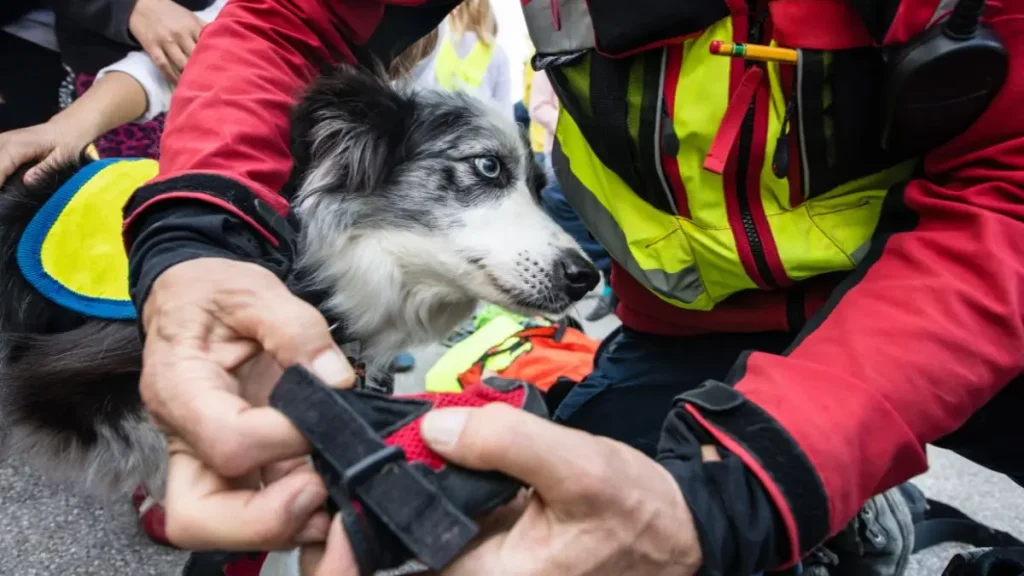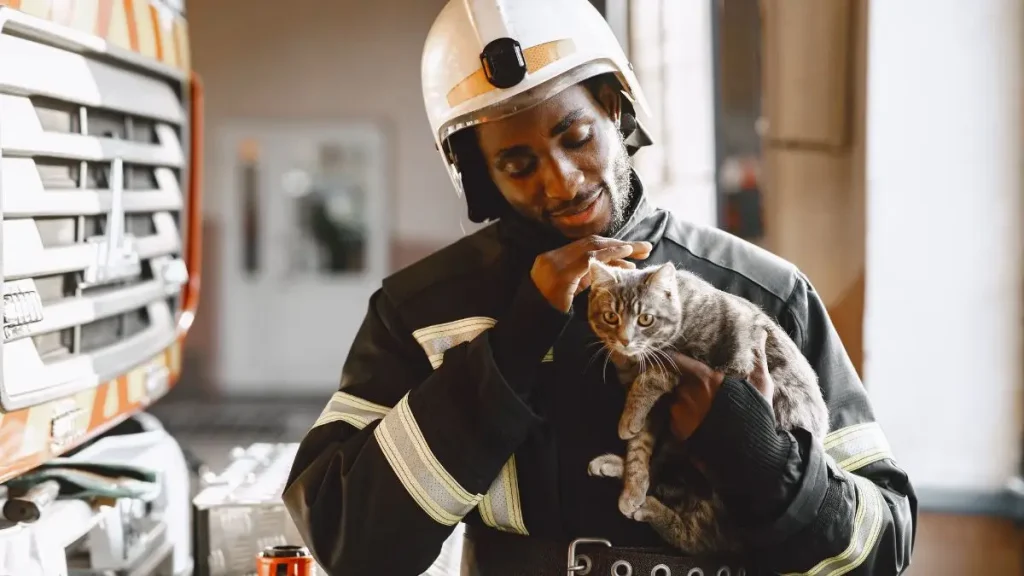Fire in North Portland Home Takes One Dog’s Life, Saves Six More
I’ve covered a lot of house fire stories over the years. Most of them follow a pattern: fast-moving flames, quick fire response, a family shaken but safe. But this one from North Portland hit differently.
Early Wednesday morning, a quiet street on North Attu woke up to flashing lights, heavy smoke, and the kind of panic that only fire brings. Inside the single-story home were seven dogs. Only six made it out alive.
One didn’t.
It’s the kind of detail that sticks with you—not just because a life was lost, but because firefighters did everything they could. They pulled all seven dogs from the smoke-filled house. Three of them needed to be resuscitated on the spot. And they were, using special oxygen masks designed just for pets.
We don’t always hear those parts. Most headlines mention “damage” or “injuries.” But the quiet heroism—the fact that trained crews carry oxygen masks for animals, that they’ll risk smoke to save a pet—is what this story is really about.
Have you ever thought about what would happen to your pets in a house fire? Let me know in the comments—what’s your emergency plan for them, if any?
The Fire: What Happened on North Attu Street That Morning
It was just after 6 a.m. when the first 911 calls came in. Smoke was pouring from a home on North Attu Street in Portland, and neighbors knew something was wrong.
When firefighters pulled up, they saw thick, dark smoke rising from both the front and back of the house. Crews rushed in, knowing the situation could get worse fast. According to a report by KGW News, the fire was intense but knocked down within 15 minutes of arrival. That may sound fast—but in a house filled with people and pets, every second counts.
What made it harder was the structure itself. Firefighters had to pull down parts of the ceiling to chase hidden flames that had spread above them. As one lieutenant put it, that kind of work causes more destruction, but it’s necessary to make sure the fire doesn’t reignite.
It’s a reminder that even a “small” fire can completely gut a home in minutes. And for families inside, including pets, the window to escape is razor thin.
All Residents Escaped — One Hospitalized for Smoke Inhalation
By the time firefighters got to the front door, all three people living in the house had made it outside. That part brings a bit of relief—everyone got out alive.
But not without injury.
One person was taken to the hospital with smoke inhalation. Thankfully, the injuries weren’t life-threatening. A similar medical emergency unfolded recently when a Tybee Island home fire sent a resident to the hospital, reminding us how fast these situations escalate.
Still, if you’ve ever choked on a bit of smoke near a campfire, imagine what it feels like to breathe in nothing but smoke for minutes while trying to escape your own home.
Too often, people wait too long to leave—trying to grab valuables, pets, or simply thinking the fire looks “small.” But inside that house? It was pitch black. The air wasn’t just hot—it was toxic.
The people in this fire were lucky. But that luck came from reacting fast.
One Dog Dead, Three Rescued with CPR, Three Unharmed

Seven dogs were inside that home. Seven.
Firefighters managed to pull them all out, but one didn’t make it. Smoke inhalation killed the dog before help could reach it. According to KPTV, three of the others were in serious trouble—they weren’t breathing properly and had to be resuscitated right there on the scene.
It worked.
Using specialized oxygen masks designed just for animals, firefighters were able to revive all three. The remaining three dogs were okay—scared, shaken, but physically unharmed.
Let that sink in: crews ran into a smoke-filled house not just to save people, but to save pets. That’s not just protocol—it’s personal. And if you’re a dog owner, you already know why.
Dogs don’t know where the exits are. They hide when they’re scared. That’s why in fires like this, it’s not uncommon for pets to be the ones who don’t make it out.
Have you ever had to prepare for a fire with pets in the house? Drop a comment below—I’d love to hear how you’ve planned
How Firefighters Saved the Dogs: Pet Oxygen Masks and Training
When I first learned that firefighters carry pet oxygen masks, I was surprised. You might be too. But after reading this story, it just makes sense.
Lieutenant Laurent Picard from Portland Fire & Rescue explained that every battalion chief’s car is stocked with three sizes of these pet masks. And they’re not some gimmick—they’re life-saving tools. Just like humans, pets need oxygen after inhaling smoke. The difference is, they can’t tell you what’s wrong.
Picard said something that stuck with me: pets often respond really well to pure oxygen, especially when it’s administered early. That’s what made the difference for those three dogs that were struggling to breathe. Without those masks—and the training to use them—they might not have survived either.
If you’ve got pets, think about this: would your local fire team have what they need to help them? It’s worth checking, or even donating a mask to your nearest station.
Stories like these—and real-time fire alerts—often show up first in quieter corners of the internet. I came across a few updates and local reactions earlier this morning through a WhatsApp channel that curates emergency events across the U.S. If you follow fire-related news or home safety updates, it’s worth keeping an eye on spaces like that.
Suspected Cause: Fire May Have Started in the Kitchen
Right now, the official cause of the fire is still under investigation—but there’s a strong early suspicion: it started in the kitchen.
Lt. Picard said the room was completely blacked out with smoke when crews got inside. Kitchen fires are, unfortunately, one of the most common causes of house fires. And they often start small—maybe unattended food, faulty wiring, or grease flare-ups—but quickly grow out of control when no one’s watching.
Once again, this fire didn’t just damage the kitchen. Smoke and flames traveled through the ceiling, hiding in places you wouldn’t expect. That’s why the home ended up with so much structural damage, even though it was extinguished quickly.
And that’s also why early detection matters. A working smoke alarm could be the only reason your pet or your family makes it out alive.
How to Prepare Your Pets for a Fire Emergency?
If this story has you thinking, “What would happen to my dog in a fire?”—that’s the right question to ask.
Because here’s the truth: most of us have zero plan for our pets in an emergency.
So let’s fix that.
First, make sure you’ve got working smoke alarms on every floor—and test them monthly. Not just near the kitchen, but in bedrooms, the attic, and the basement too.
Next, create an escape plan that includes your pets. That could mean having leashes by the door, practicing evacuation routes, or even putting up a “pet inside” rescue decal on your front window.
If you live in Portland, check with your local fire station. Many have pet oxygen masks and offer fire safety resources specific to animals. You can also get more tips from the Red Cross pet preparedness guide.
Remember—your pet depends entirely on you when things go wrong. A few minutes of planning now could mean everything later.
Lt. Picard shared something deeply personal: he’s responded to fires where people made it out safely—then went back inside for a pet, or to grab something important. And they didn’t come back out. That tragic pattern isn’t rare—just recently, a man in St. Louis lost his life in an overnight house fire, reinforcing the need to stay out once you’re out.
Mental Health Support After Pet Loss: Red Cross Steps In

Losing a pet in a fire isn’t just a “sad moment.” For many of us, it’s like losing a family member.
That’s why I was genuinely moved to hear what the American Red Cross is doing behind the scenes. According to Isabel Anderson, their regional communications manager, the Red Cross offers emotional support for anyone dealing with pet loss after a disaster.
They have trained disaster mental health volunteers who actually call victims to talk through grief, especially when a beloved pet is involved. That kind of empathy is rare—and powerful.
And it’s not just about mental health. If you’ve lost glasses, medications, or essential items in a fire, the Red Cross helps you get what you need right away. They even offer shelters that can accept pets, depending on the location.
It’s easy to feel alone after something traumatic. But this part of the story reminded me: you don’t have to handle it by yourself.
Pet Fire Rescues Are Rare — But Firefighters Are Ready
Here’s something I didn’t expect to learn: animal rescues in fires aren’t that common, but when they happen, Portland firefighters are ready.
Lieutenant Picard mentioned that they don’t often have to perform CPR on dogs—but when they do, the pets typically respond well. That’s thanks to the oxygen masks they carry, and the training crews have received to care for animals under stress.
It might not seem like a big deal, but think about it: we train fire crews for everything. Why not pet rescues, too?
And in this case, it paid off. Three dogs were saved from smoke inhalation because of those masks. That’s not a fluke—that’s preparation in action. In fact, even in smaller incidents like a recent Indiana home fire where the resident had minor injuries, it’s the basics—training, alarms, oxygen—that make all the difference.
If more communities followed this model, more pets might survive. It’s something worth asking about the next time you visit or support your local fire department.
Final Thoughts
I wish this story had a perfect ending. It doesn’t. One dog didn’t make it.
But six others did—because firefighters were trained, equipped, and ready. Because someone called 911 fast. Because oxygen masks weren’t just for people.
If you’re a pet owner, let this be a wake-up call. Don’t wait for something tragic to realize your escape plan is missing. Talk to your family. Check your alarms. Think through your exits—with your pets in mind.
That one small step could be the reason your story ends differently.
Want to read more real stories like this? Visit our Home Incidents section for the latest updates and preventative tips.
Disclaimer: This article is based on verified reports and official statements from Portland Fire & Rescue and the American Red Cross. All safety advice is general and should be adapted to your home’s unique setup. For personalized guidance, consult your local fire department or emergency response agency.


